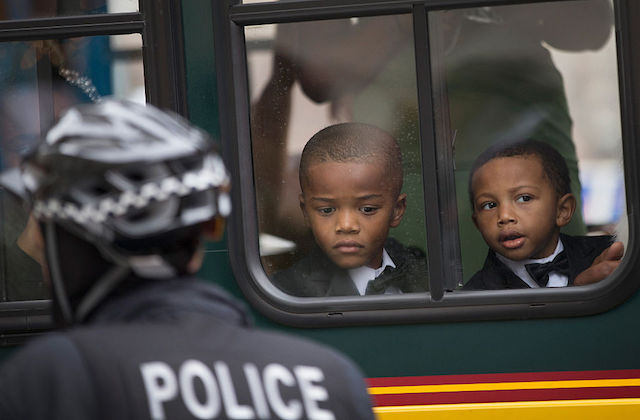Black men are six times more likely to be incarcerated than their White counterparts. A new op-ed from criminal defense attorneys Angela J. Davis and Kristin Henning says that this disparity starts well before Black boys become adults. From the essay:
Black boys are policed like no other demographic. They are policed on the street, in the mall, in school, in their homes and on social media. Police stop Black boys on the vaguest of descriptions—“Black boys running,” “two Black males in jeans, one in a gray hoodie,” “Black male in athletic gear.” Young Black males are treated as if they are “out of place” not only when they are in White, middle-class neighborhoods, but also when they are hanging out in public spaces or sitting on their own front porches.
The article, which was published yesterday (May 23) by NPR’s Code Switch, goes on to describe how this treatment impacts the way Black boys see and interact with law enforcement:
Adolescence is a critical time during which young people come to understand and respect or resent the law and legal institutions. Negative attitudes about the police acquired during childhood and adolescence have a “lasting” effect as youth transition to adulthood. The long history of aggressive and biased interactions with the police—perceived or real—has socialized a generation of Black boys to avoid contact with the police whenever possible and if not, to be hostile—sometimes outright confrontational—with police.
The authors then discuss a study that illustrates the implicit bias at work:
In a recent study of police perceptions of childhood innocence, researchers showed police officers a series of photographs of young White, Black and Latino males engaged in some purported criminal activity and asked them to estimate the age of each child. While the officers overestimated the age of adolescent Black felony suspects by 4.59 years, they underestimated the age of adolescent White felony suspects by one year. Because of these types of distorted perceptions, Black boys are more likely to be treated as adults much earlier than other youth, more likely to be arrested, harassed and assaulted for normal adolescent behavior, and more likely to be perceived as culpable and deserving of punishment or even death.
Davis and Henning close with recommendations for potentially life-saving early interventions to interrupt the way law enforcement officers interact with Black boys and men:
To aid this reform, we should revisit our extensive reliance on police in schools, mandate officer training on adolescent development and implicit bias, and require deep shifts in police policy and procedure to facilitate new opportunities for genuine, positive interactions between Black youth and the police. Without these reforms, the unfair policing of Black boys—and Black men—will continue.
Read the full essay here.
